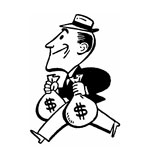
Recovering the Virtue of Prudence in an Age of Fraud
LAST THINGS
The financial crisis of recent months has been more severe than anything seen for decades. Comparisons have been made to the Great Depression, but the two events are dissimilar in many ways. The Depression lasted for ten years and was a period of real economic hardship for millions of people. Today, the country is still rich, although less so than it was. Still, there was a financial crash starting in October 2008. It has been a period of financial instability and, for many, real anxiety. The money that seemed to be available for retirement is no longer there.
The present crisis — the word for once is not just hyperbole — was as abrupt as a precipice and unforeseen by watchdogs in Washington and experts on Wall Street. Books will be written about this unprecedented event, and because it was unprecedented we don’t know how it will end. It is especially worrisome because a nearly simultaneous tumble occurred in advanced economies all across the world.
It is instructive to note that the economic and the moral are not entirely unconnected when it comes to this present crisis.
The underlying problem was that credit was extended far beyond what makes sense in any rational, productive system. We have heard about the Ponzi scheme of Bernie Madoff, but the ever-increasing expansion of credit on an inadequate base was unsustainable. It, too, had Ponzi-like properties.
You May Also Enjoy
His vision suggests that free men are those who resist machinery, overcome or subvert propaganda, believe in God, and act responsibly toward both past and present.
All our actions in enterprise must be, according to John Paul II, "in conformity with the dignity and integral vocation of the human person."
We must try to understand the rich corpus of Catholic social doctrine in its context and entirety by reading and consulting the original documents.

